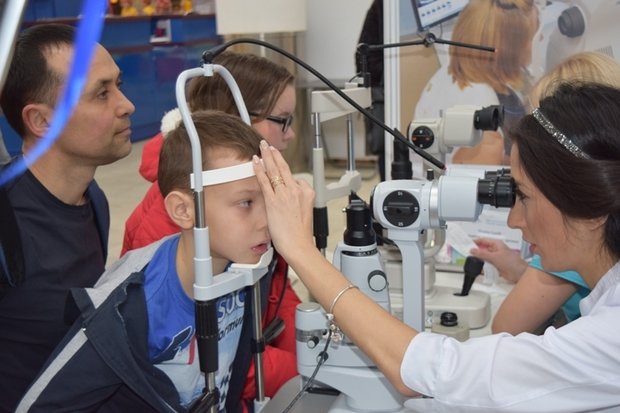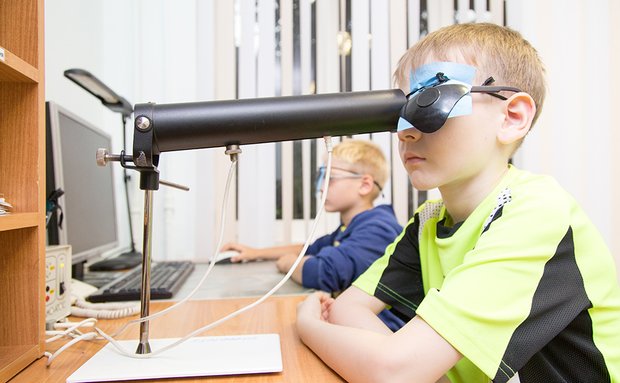Aleksey Rascheskov: ''The worst parenting is 'here's a gadget, just don't cry''
Chief pediatric ophthalmologist of the Republic of Tatarstan about vision problems of children
Head of the Department of Ophthalmology in the Children's Republican Clinical Hospital Aleksey Rascheskov has the personal website ''Healthy View of Life'' on the Internet. On the main page, the wish-motto catches the eye: ''We wish you health!'' It is in large letters, so that even those who have bad sight could read this line. The chief pediatric ophthalmologist at the Ministry of Health of the Republic of Tatarstan told how and whom they help in the hospital to gain good eyesight and where non-child problems with the eyes of little children come from in the interview to Realnoe Vremya.
Carrot is powerless against gadgets
Dr Rascheskov, does the Children's Republican Clinical Hospital, equipped with almost up-to-date technology, accept only complicated patients or anyone who needs help? In other words, do you only work with unique, complex cases?
Since the maximum qualification of personnel and material and technical support of our work are concentrated here, we are faced with those eye diseases that are not treated with drops or some drugs. In general, there are two large streams of patients. One group is with refractive disorders (shortness of vision), such patients often receive care and treatment not in our hospital, but in clinics, paid ophthalmological offices. The second group, which is most often treated here, suffer from pathologies that require surgery in the condition of round-the-clock inpatient facility.
Every second child today wears glasses…
Yes, this is exactly the group of patients who have impaired refraction. Its large number is primarily associated with the increased intensity of work. That is, with the advent of electronic devices. It is a global problem, there is a natural process — adaptation to environmental conditions. Earlier, for a person, relatively speaking, it was necessary to look from a palm tree into the distance — whether there was a threat. And he didn't have myopia. Now we have the dominance of gadgets, we have to strain eyes when looking at the screen — and as a result, there is a need to wear glasses. Besides, the number of congenital and chromosomal abnormalities is increasing due to the fact that medicine in the recent time has begun to nurse the children, who, according to the understanding of the Lord, are not supposed to be alive. But we do everything we can to the last.

''Earlier, for a person, relatively speaking, it was necessary to look from a palm tree into the distance — whether there was a threat. And he didn't have myopia. Now we have the dominance of gadgets, we have to strain eyes, looking at the screen — and as a result, there is a need to wear glasses.'' Photo: Oleg Tikhonov
As a child I ate raw carrots a lot, but it did not help me to take off my glasses. On the other hand, people are what they eat. Is the child's vision also the result of what he eats?
Well, first of all, who knows what would happen if you didn't eat carrots? Second, if the baby is born… No, even if it's already conceived, the diet won't change anything. Here is the question of woman's systemic health, about her health before conceiving a child… But it is also wrong to blame the parents that they eat wrong and therefore the vision and general health of the child leaves much to be desired. The environment plays an important role here. Meat with antibiotics and growth hormones, plants grown with stimulants and so on. Although you can still choose what we eat, but we do not pay attention to it. You should have conscious attitude to food, and then you can manage the processes associated with health!
That is, there are ways to give a child good vision?
If parents take care of themselves and address the issue of the birth of a child responsibly, then their children are born without impairments. Although not everything depends on parents: there may be mutations during pregnancy, and infections that are outwardly harmless, but can affect the fetus. On the other hand, if parents have already developed a certain attitude to health, nutrition by the age of 25-30, they have formed the wrong way of life, children can be born with disabilities or acquire them at an early age. It often happens that a mother, who sits at home, does not work, instead of spending time with the child, gives him gadgets. And the child is silent, he does not interrupt her from doing something else. But such education greatly slows down the psycho-emotional development of children and affects the organs of vision. The most basic thing that can cause visual impairment of a child is parenting by the principle ''just do not cry''! However, the parents also cannot behave themselves perfectly. Since 1992, the general level of consciousness of the population has been averaging and decreasing. What the society is, the similar is the state of health.

''The environment plays an important role here. Meat with antibiotics and growth hormones, plants grown with stimulants and so on. Although you can still choose what we eat, but we do not pay attention to it. You should have conscious attitude to food, and then you can manage the processes associated with health!'' Photo: Oleg Tikhonov
Keep an eye on the baby!
How, at what age should parents look closely to the child, so as not to miss the pathology of vision?
The pathology in a child can be detected from birth. Therefore, it is necessary from the first days to look at it carefully. And to see deviations: for example, the eye deviates in the wrong direction, changed colour. Or a child turns the whole body to look at something… All this can be seen in the first two or four months. There are preventive examinations, where you can identify the problem, but usually the parents themselves notice the diseases.
The problem of retinopathy of preterm babies is being increasingly discussed in parent communities, there were high-profile scandals, children's ophthalmologists were accused that they had not prescribed drops in time and children went blind…
Term babies do not have retinopathy, and drops do not solve the problem. The truth here is that vision changes in preterm babies should be closely monitored from the very first days. Retinopathy first appeared in the mid-60s, when we began to nurse preterm babies and give them oxygen. In simple terms, there is such a mechanism: not giving oxygen — lungs of the child do not work normally, giving extra — there will be retinopathy.
Preterm babies were born before as well. But they didn't have retinopathy until some point, no?
I'm 46. When I started medical school, the fetus, which was 28 weeks old, was not considered necessary to save. But today 22 weeks — already the formal criterion for nursing. If earlier the birth of a child weighing 500 grams was nonsense, today such children are successfully nursed…
But the technology has changed, and doctors have different opportunities!
Yes, but retinopathy of preterm babies is a disease characteristic of the middle developed countries. In those countries where the level of medicine is very high, it practically does not occur, because measures are taken in time. Where it is low, it doesn't exist because preterm babies do not survive. But we're in the middle so far…

''School myopia is a scourge. If in primary school myopia is found in almost 30% of school students, then it is 70-80% in 10-11th graders.'' Photo: rascheskoff.ru
Will myopia become the norm?
There is another common opinion that vision problems appear at school…
It is true. School myopia is a scourge. If in primary school myopia is found in almost 30% of school students, then it is 70-80% in 10-11th graders.
Why does the vision become worse so dramatically?
The load becomes more and more intense, the time of work at a close distance increases, stress resistance of children against the background of ecology and malnutrition decreases… All this affects the development of pathologies.
Why are farsighted people getting less?
Farsightedness, or hypermetropia, is part of the norm of the biological species of human being. This is mainly due to the shortening of the eye length from the standard norm. But today there is the tendency to myopia, the eyes are more set to minus. Maybe in 50 years, myopia will be the norm, and everything else will be a deviation.

''We need consistency. This is a huge preventive work, which should be distinguished as a separate area of school medicine.'' Photo: rkob.ru
Is it possible to stop the deterioration of vision?
It is. But for this purpose a state programme should be launched. Approaches, mechanisms, standards should be developed, their observance and control should be ensured. We have the established system of inspections, and we have no control system. It is possible to carry out some activities in each school, to monitor the fatigue of the organs of vision. We need consistency. This is a huge preventive work, which should be distinguished as a separate area of school medicine.